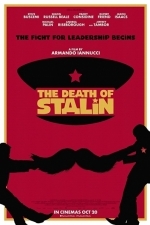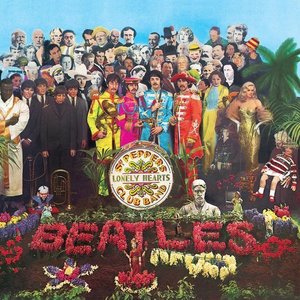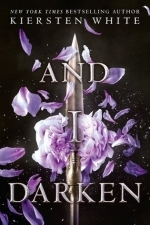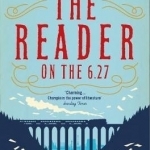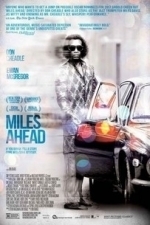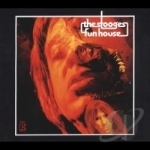Search
Search results
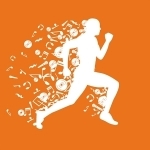
RockMyRun
Health & Fitness
App Watch
Get more motivation from your workout music. RockMyRun works with the world’s best DJs to craft...
health and fitness
Bob Mann (459 KP) rated The Death Of Stalin (2017) in Movies
Sep 29, 2021
Death…. Torture…. Child Abuse…. LOL??
Armando Iannucci is most familiar to TV audiences on both sides of the pond for his cutting political satire of the likes of “Veep” and “The Thick of It”, with his only previous foray into directing movies being “In the Loop”: a spin-off of the latter series. Lovers of his work will know that he sails very close to the wind on many occasions, such that watching can be more of a squirm-fest than enjoyment.
Rupert Friend (centre) tries to deliver a eulogy to his father against winged opposition. With (from left to right) Michael Palin, Jeffrey Tambor, Steve Buscemi and Simon Russell Beale.
It should come as no surprise then that his new film – “The Death of Stalin” – follows that same pattern, but transposed into the anarchic and violent world of 1950’s Russia. Based on a French comic strip, the film tells the farcical goings on surrounding the last days of the great dictator in 1953. Stalin keeps distributing his “lists” of undesirables, most of who will meet unpleasant ends before the end of the night. But as Stalin suddenly shuffles off his mortal coil, the race is on among his fellow commissariat members as to who will ultimately succeed him.
Stalin…. Going… but not forgotten.
The constitution dictates that Georgy Malenkov (an excellently vacillating Jeffrey Tambor) secedes but, as a weak man, the job is clearly soon going to become vacant again and spy-chief Lavrentiy Beria (Simon Russell Beale) and Nikita Khrushchev (Steve Buscemi) are jostling for position. (No spoilers, but you’ll never guess who wins!). Colleagues including Molotov (Michael Palin) and Mikoyan (Paul Whitehouse) need to decide who to side with as the machinations around Stalin’s funeral become more and more desperate.
The film starts extremely strongly with the ever-excellent Paddy Considine (“Pride”) playing a Radio Russia producer tasked with recording a classical concert, featuring piano virtuoso Maria Yudina (Olga Kurylenko, “Quantum of Solace”). A definition of paranoia in action!
Great fingering. Olga Kurylenko as Yudina, with more than a hand in the way the evening’s events will unfold.
We then descend into the chaos of Stalin’s Russia, with mass torture and execution colouring the comedy from dark-grey to charcoal-black in turns. There is definitely comedy gold in there: Khrushchev’s translation of his drunken scribblings from the night before (of things that Stalin found funny and – more importantly – things he didn’t) being a high point for me. Stalin’s children Svetlana (Andrea Riseborough, “Nocturnal Animals”) and Vasily (Rupert Friend, “Homeland”) add knockabout humour to offset the darker elements, and army chief Georgy Zhukov (Jason Isaacs, “Harry Potter”) is a riot with a no-nonsense North-of-England accent.
Brass Eye: Jason Isaacs as the army chief from somewhere just north of Wigan.
Production values are universally excellent, with great locations, great sets and a screen populated with enough extras to make the crowd scenes all appear realistic.
Another broad Yorkshire accent: (the almost unknown) Adrian McLoughlin delivers an hysterical speaking voice as Stalin.
The film absolutely held my interest and was thorougly entertaining, but the comedy is just so dark in places it leaves you on edge throughout. The writing is also patchy at times, with some of the lines falling to the ground as heavily as the dispatched Gulag residents.
It’s not going to be for everyone, with significant violence and gruesome scenes, but go along with the black comic theme and this is a film that delivers rewards.
Rupert Friend (centre) tries to deliver a eulogy to his father against winged opposition. With (from left to right) Michael Palin, Jeffrey Tambor, Steve Buscemi and Simon Russell Beale.
It should come as no surprise then that his new film – “The Death of Stalin” – follows that same pattern, but transposed into the anarchic and violent world of 1950’s Russia. Based on a French comic strip, the film tells the farcical goings on surrounding the last days of the great dictator in 1953. Stalin keeps distributing his “lists” of undesirables, most of who will meet unpleasant ends before the end of the night. But as Stalin suddenly shuffles off his mortal coil, the race is on among his fellow commissariat members as to who will ultimately succeed him.
Stalin…. Going… but not forgotten.
The constitution dictates that Georgy Malenkov (an excellently vacillating Jeffrey Tambor) secedes but, as a weak man, the job is clearly soon going to become vacant again and spy-chief Lavrentiy Beria (Simon Russell Beale) and Nikita Khrushchev (Steve Buscemi) are jostling for position. (No spoilers, but you’ll never guess who wins!). Colleagues including Molotov (Michael Palin) and Mikoyan (Paul Whitehouse) need to decide who to side with as the machinations around Stalin’s funeral become more and more desperate.
The film starts extremely strongly with the ever-excellent Paddy Considine (“Pride”) playing a Radio Russia producer tasked with recording a classical concert, featuring piano virtuoso Maria Yudina (Olga Kurylenko, “Quantum of Solace”). A definition of paranoia in action!
Great fingering. Olga Kurylenko as Yudina, with more than a hand in the way the evening’s events will unfold.
We then descend into the chaos of Stalin’s Russia, with mass torture and execution colouring the comedy from dark-grey to charcoal-black in turns. There is definitely comedy gold in there: Khrushchev’s translation of his drunken scribblings from the night before (of things that Stalin found funny and – more importantly – things he didn’t) being a high point for me. Stalin’s children Svetlana (Andrea Riseborough, “Nocturnal Animals”) and Vasily (Rupert Friend, “Homeland”) add knockabout humour to offset the darker elements, and army chief Georgy Zhukov (Jason Isaacs, “Harry Potter”) is a riot with a no-nonsense North-of-England accent.
Brass Eye: Jason Isaacs as the army chief from somewhere just north of Wigan.
Production values are universally excellent, with great locations, great sets and a screen populated with enough extras to make the crowd scenes all appear realistic.
Another broad Yorkshire accent: (the almost unknown) Adrian McLoughlin delivers an hysterical speaking voice as Stalin.
The film absolutely held my interest and was thorougly entertaining, but the comedy is just so dark in places it leaves you on edge throughout. The writing is also patchy at times, with some of the lines falling to the ground as heavily as the dispatched Gulag residents.
It’s not going to be for everyone, with significant violence and gruesome scenes, but go along with the black comic theme and this is a film that delivers rewards.
Daniel Boyd (1066 KP) rated Sgt. Pepper's Lonely Hearts Club Band by The Beatles in Music
Nov 2, 2017
One Of The Most Influential Albums Of All Time
The reason that this album is so influential and important to everything that came after it is simple, it was the first true example of what we think of as a concept album today. The album opens with an introduction to what you are about to witness, which is something that had never even been considered before in music. Sgt Pepper’s Lonely Heart’s Club Band was also very meta for its time considering that the first song informs you of the members that this band is made up from and gives you a reason as to why they are performing these songs to you. Equally, ending the album with the Sgt Pepper’s Lonely Heart’s Club Band reprise brings the whole thing full circle, and this formula became what was adopted by concept all albums going forward, The Who followed the same structure, as did Pink Floyd and Green Day. Musically, the record continued where Revolver, (the previous album,) left off, engraining the Beatles as pioneers in psychedelic music. Songs such as, ‘Lucy in the Sky With Diamonds,’ and ‘Within You, Without You,’ where more far out than any other psychedelic musical piece had been before. Then you have tracks such as ‘When I’m Sixty Four,’ and ‘Getting Better,’ which utilize classical instruments normally found in orchestral music. This totally rewrote the rules on what a pop song could do. Every song on Sgt. Pepper is a masterpiece and each earns that title both on an individual basis and as part of a whole and all for their own unique reasons. There is also the fact that the album contains what I consider to be the band’s greatest song, ‘A Day In The Life.’ It is the final track on the album, often considered an epilogue, as the album officially ends with the reprise of Sgt Pepper’s Lonely Heart’s Club Band and forty years later, it still sends tingles down the spine of anyone that has the honor to listen to it. Lennon’s parts bookend the track while the middle section belongs to McCartney. As is the case with the rest of the album, the song points out the juxtaposition of Lennon’s narcissistic realist view on the world versus McCartney’s brighter more optimistic outlook on life. Then the song ends with a beautifully chaotic climax of instruments all playing together, building from their respective lowest notes to their highest. It so clearly ends the album, there is no fade out, its everything coming together and playing simultaneously and then stopping all in unison, a very purposeful and definite way to end an album.
Even when the album is over the Beatles are still innovating by including a creepy loop within the groove of the album, implemented to give listeners a fright as they only expect to hear silence after the climax of ‘A Day In The Life.’ After a few moments of peace, a high pitched frequency is heard followed by a peculiar mix of abstract sounds all at once. Even after all this time, after the ridiculously high number of times that I’ve listened to the record and although I know to expect the sound before it happens, it’s still chilling to this day. This was the first time that a band intentionally included hidden sounds on an album, making listeners sit through a few seconds of silence to hear it. People claim that this album is overrated, but there is a reason that it is held in such high regard and whether you think this album deserves its legendary status or not, it is impossible to debate the fact that it is probably the most important album ever recorded. Everything from the album artwork to the music and the lyrics is still extremely relevant and important, even in this current digital age of music.
Even when the album is over the Beatles are still innovating by including a creepy loop within the groove of the album, implemented to give listeners a fright as they only expect to hear silence after the climax of ‘A Day In The Life.’ After a few moments of peace, a high pitched frequency is heard followed by a peculiar mix of abstract sounds all at once. Even after all this time, after the ridiculously high number of times that I’ve listened to the record and although I know to expect the sound before it happens, it’s still chilling to this day. This was the first time that a band intentionally included hidden sounds on an album, making listeners sit through a few seconds of silence to hear it. People claim that this album is overrated, but there is a reason that it is held in such high regard and whether you think this album deserves its legendary status or not, it is impossible to debate the fact that it is probably the most important album ever recorded. Everything from the album artwork to the music and the lyrics is still extremely relevant and important, even in this current digital age of music.
Jamie (131 KP) rated And I Darken (The Conqueror's Saga #1) in Books
Jul 15, 2017
Well developed characters with complex relationships (1 more)
Engaging story
What if Vlad the Impaler was a girl? An engrossing historical dark fantasy
I was surprised to find that the story had two main characters, Lada and her younger brother Radu. The story is told from their alternating points of view from childhood up to early adulthood. The siblings are sent from their homeland as hostages to the sultan to ensure their father’s loyalty. The story follows the siblings through their journey of self discovery as their fates become entangled with Mehmed II, the virtuous son of the sultan with dreams of conquest.
Lada is fierce even from a young age, a vicious child that is often described as being ugly. She is abrasive and domineering with an intense hunger to claim and rule over what she views as hers. She is frustrated by the limitations placed on her for being a woman, craving power and freedom given to her brother for the simple fact that he is a man. Lada wrestles with her femininity, at some times rejecting it entirely and at other times trying to accept herself and her needs as a woman. She idolizes her father and later the janissaries, wanting desperately to be recognized and accepted. Lada seeks to return home to her mother Wallachia, her birthright.
In stark contrast to Lada, he is sensitive and beautiful. As a child he cried easily and like his sister he also desperately sought affection and acceptance from others. Beginning with their father, their nursemaid, Lada, and eventually Mehmed. While Lada seeks power through brute strength Radu finds a means to his ends through manipulation, using his attractiveness to gain the respect and trust of the people around him. Radu finds his home in Islam and the empire under the watchful eye of the father, the Sultan.
The parallels between Lada and Radu are a subversion of the classical gendered stereotypes placed on men and women. The bonds between Lada, Radu, and Mehmed were incredibly complex and toxic for all involved. The book doesn’t shy away at all from the hideous aspects of love and jealousy and gives an honest and intimate portrayal of the characters as they stumble into adulthood.
This book is loosely based on three very real historical figures: Vlad the Impaler, Radu the Fair, and Mehmed II. Despite this, the book is in no way to be considered to be historically factual, as noted by the author. Lada’s gender change aside there is definitely many pieces of history that are changed deliberately to make room not only for a new romance but also for a more neutral portrayal of the character. This is definitely a medieval fantasy and alternate history book which I’m quite frankly fine with and was able to enjoy just the same. The setting and characters were fairly convincing for the time period and appreciated the research and detail that was put into the book to make it at least believable.
I expected a little more war and battle in this book but there was actually next to none. There was much more focus on the political aspects of the story which I think was alright considering the ages of the main characters. I do expect to see more combat in the next book though, so maybe Lada will actually be the brutal warrior princess she was destined to be.
Despite my mild complaints about the historical aspects of this book I thoroughly enjoyed myself reading it. I was initially intimidated by the page count for this book but found myself flying through the pages. And I Darken is masterfully written and really polished compared to a lot of YA literature. Definitely one of my favorites and I am absolutely ecstatic to continue the series.
Lada is fierce even from a young age, a vicious child that is often described as being ugly. She is abrasive and domineering with an intense hunger to claim and rule over what she views as hers. She is frustrated by the limitations placed on her for being a woman, craving power and freedom given to her brother for the simple fact that he is a man. Lada wrestles with her femininity, at some times rejecting it entirely and at other times trying to accept herself and her needs as a woman. She idolizes her father and later the janissaries, wanting desperately to be recognized and accepted. Lada seeks to return home to her mother Wallachia, her birthright.
In stark contrast to Lada, he is sensitive and beautiful. As a child he cried easily and like his sister he also desperately sought affection and acceptance from others. Beginning with their father, their nursemaid, Lada, and eventually Mehmed. While Lada seeks power through brute strength Radu finds a means to his ends through manipulation, using his attractiveness to gain the respect and trust of the people around him. Radu finds his home in Islam and the empire under the watchful eye of the father, the Sultan.
The parallels between Lada and Radu are a subversion of the classical gendered stereotypes placed on men and women. The bonds between Lada, Radu, and Mehmed were incredibly complex and toxic for all involved. The book doesn’t shy away at all from the hideous aspects of love and jealousy and gives an honest and intimate portrayal of the characters as they stumble into adulthood.
This book is loosely based on three very real historical figures: Vlad the Impaler, Radu the Fair, and Mehmed II. Despite this, the book is in no way to be considered to be historically factual, as noted by the author. Lada’s gender change aside there is definitely many pieces of history that are changed deliberately to make room not only for a new romance but also for a more neutral portrayal of the character. This is definitely a medieval fantasy and alternate history book which I’m quite frankly fine with and was able to enjoy just the same. The setting and characters were fairly convincing for the time period and appreciated the research and detail that was put into the book to make it at least believable.
I expected a little more war and battle in this book but there was actually next to none. There was much more focus on the political aspects of the story which I think was alright considering the ages of the main characters. I do expect to see more combat in the next book though, so maybe Lada will actually be the brutal warrior princess she was destined to be.
Despite my mild complaints about the historical aspects of this book I thoroughly enjoyed myself reading it. I was initially intimidated by the page count for this book but found myself flying through the pages. And I Darken is masterfully written and really polished compared to a lot of YA literature. Definitely one of my favorites and I am absolutely ecstatic to continue the series.
Samantha Hemsley (2 KP) rated The Reader on the 6.27 in Books
Jun 30, 2019
Feel-good (4 more)
Simple easy-to read style
A celebration of the power of reading
Lovable characters
Brilliant translation from French
I'm so glad to have come across this little hidden gem.
The unfortunately named (apparently -- I think you have to be a French speaker to really understand the reasoning) Guylain Vignolles is 36, lives alone with his beloved goldfish and works in a job he detests -- operating a book-pulping machine in a publishing factory. Guylain alleviates his resultant mental anguish by rescuing the occasional surviving pages at the end of each shift and reading them aloud to his fellow commuters on the 6.27 train each morning much to their mingled bewilderment and joy. Featuring some wonderful larger-than-life characters such as the classical theatre loving security guard who only speaks in Verse and the reformed alcoholic engaged in a quest to be reunited with his missing limbs and the toilet attendant with a secret talent for writing, this book is quirky and a bit ridiculous in the very best way.
As a fellow book lover, I empathised with Guylain's heartbreak over destroying so many books day in and day out. I can't even bear to write in a book or fold the corner of a page never mind reduce them to a pulp! I absolutely loved the way he attempted to do the books justice by giving what pages he could save an audience. This book is a real testament to the power and pleasure of reading aloud which is something I'm hugely passionate about -- I even wrote one of my university dissertations about the benefits of reading aloud with children.
I also loved its message of how reading can unite people, despite it being seen as a generally quite solitary or even introverted activity. Through his reading, Guylain finds himself being invited to do regular readings at a care home, much to the delight of the residents and when he finds a USB stick on his usual train seat containing over 70 diary entries, the lonely Guylain might just find that it leads to true love.
As well as being very charming and quaint, the novel manages to avoid becoming trite with its very astute observations and brilliant humour -- often laugh-out-loud funny. The prose is simple but very skillful -- especially the verses concocted by Yvon the security guard. Huge credit must also be given to the translator here. (The book was originally written in French) To translate rhyme into a different language so that it still rhymes and still makes perfect sense in the context can't be an easy feat!
My only criticism is that the book is very short -- fewer than 200 pages. Apparently the author is usually a writer of short stories and this is his first novel. This definitely shows as the ending feels very abrupt and definitely as if it could have done with another 50 pages or so; perhaps even more. I wasn't ready to say goodbye yet! Having said that, the ending was very sweet and it was only its abruptness that prevented it from being 100% satisfactory. I wouldn't quite say that there are any loose ends but it would have been nice to find out a little more about some of the characters and their stories.
Overall though this was a really lovely feel-good read that will appeal to anyone who loves literature and zany but endearing characters. I read one review that said the plot was "outlandish" and the characters "unbelievable" but I believe this reviewer was missing the point. This book champions the escapist qualities of reading and to have a story and characters who perhaps just slightly transcend reality can only elevate the escapism just that bit more. Feasibility be damned, I loved Guylain and his supporting cast members and I think I could easily read this short but sweet little story again and again!
The unfortunately named (apparently -- I think you have to be a French speaker to really understand the reasoning) Guylain Vignolles is 36, lives alone with his beloved goldfish and works in a job he detests -- operating a book-pulping machine in a publishing factory. Guylain alleviates his resultant mental anguish by rescuing the occasional surviving pages at the end of each shift and reading them aloud to his fellow commuters on the 6.27 train each morning much to their mingled bewilderment and joy. Featuring some wonderful larger-than-life characters such as the classical theatre loving security guard who only speaks in Verse and the reformed alcoholic engaged in a quest to be reunited with his missing limbs and the toilet attendant with a secret talent for writing, this book is quirky and a bit ridiculous in the very best way.
As a fellow book lover, I empathised with Guylain's heartbreak over destroying so many books day in and day out. I can't even bear to write in a book or fold the corner of a page never mind reduce them to a pulp! I absolutely loved the way he attempted to do the books justice by giving what pages he could save an audience. This book is a real testament to the power and pleasure of reading aloud which is something I'm hugely passionate about -- I even wrote one of my university dissertations about the benefits of reading aloud with children.
I also loved its message of how reading can unite people, despite it being seen as a generally quite solitary or even introverted activity. Through his reading, Guylain finds himself being invited to do regular readings at a care home, much to the delight of the residents and when he finds a USB stick on his usual train seat containing over 70 diary entries, the lonely Guylain might just find that it leads to true love.
As well as being very charming and quaint, the novel manages to avoid becoming trite with its very astute observations and brilliant humour -- often laugh-out-loud funny. The prose is simple but very skillful -- especially the verses concocted by Yvon the security guard. Huge credit must also be given to the translator here. (The book was originally written in French) To translate rhyme into a different language so that it still rhymes and still makes perfect sense in the context can't be an easy feat!
My only criticism is that the book is very short -- fewer than 200 pages. Apparently the author is usually a writer of short stories and this is his first novel. This definitely shows as the ending feels very abrupt and definitely as if it could have done with another 50 pages or so; perhaps even more. I wasn't ready to say goodbye yet! Having said that, the ending was very sweet and it was only its abruptness that prevented it from being 100% satisfactory. I wouldn't quite say that there are any loose ends but it would have been nice to find out a little more about some of the characters and their stories.
Overall though this was a really lovely feel-good read that will appeal to anyone who loves literature and zany but endearing characters. I read one review that said the plot was "outlandish" and the characters "unbelievable" but I believe this reviewer was missing the point. This book champions the escapist qualities of reading and to have a story and characters who perhaps just slightly transcend reality can only elevate the escapism just that bit more. Feasibility be damned, I loved Guylain and his supporting cast members and I think I could easily read this short but sweet little story again and again!
Gareth von Kallenbach (980 KP) rated Miles Ahead (2016) in Movies
Aug 6, 2019
If you’ve ever found yourself in a coffee shop, bookstore, or perhaps even a jazz club in the 21st century you can’t NOT have heard either the name ‘Miles Davis’, his music, or perhaps both. If you’ve been living under a rock your whole life and by some miracle you have a smartphone, computer, or a radio find a jazz station and it’s almost a sure thing you’ll here his music within minutes. The man is no myth although the man and his music are so legendary there is almost a mythical presence to him. He is one of the greats. No question. No argument.
‘Miles Ahead’ is a biopic about the legendary jazz musician directed by and staring Don Cheadle who also co-wrote the film with Steven Baigelman, Christopher Wilkinson, and Steven J. Rivele.
Emayatzy Corinealdi, Ewan McGregor, Michael Stuhlbarg, and Keith Stanfield. Rather than focus on the entire life of the great jazz musician which could encompass several films and take up an entire archive, the film focuses mainly on a period in Davis’s life where he is living in relative seclusion in his home in New York City after having retreated from the public spotlight five years previously. Miles endeavors to begin recording and playing music once again after combating addictions to alcohol and cocaine which he indulged in to deal with his wife leaving him and the heavy stress brought upon him by a loss of inspiration to compose music. At about this same time ‘Rolling Stone’ reporter Dave Braden (McGregor), a borderline paparazzi of the time but not quite, calls upon Davis begging him to let him write about Davis’s great comeback. After several futile attempts on the part of Braden, Davis reluctantly agrees after Braden introduces him to a new dealer willing to supply him with high-grade cocaine. What follows is something thats almost out of a Hunter S. Thompson book as the two attempt to recover a demo tape of Davis’s most recent recordings from a low level gangster/manager/agent who stole the from Davis’s home. Amongst the drugs and the booze and the gun fights and car chases there are brief flashbacks into Miles’s past where he relives times good and bad with his wife Frances (Corinealdi). How they met, how they lived, and how she inspired some of his greatest works through her graceful dancing and their mutual love for classical music like Eric Satie, Chopin, and Stravinsky and how he eventually lost her due to his addictions and indulgences.
For such a brief glimpse into the life of one of music’s greatest, the movie was quite well done. It was clearly a labor of love for Mr. Cheadle who had his hands in nearly every aspect of the movie and went so far as to learn to play the trumpet so he could actually play the music himself in the movie. The actor, who is amongst the best and most underrated of our time, reportedly spent six years making this film. The background music is mostly comprised of tracks from arguably one of Davis’s best albums ‘Sketches Of Spain’ and selections of his work is played by Cheadle himself. It’s sometimes difficult to tell whether the movie is more about the music or the man himself. Does it honestly matter though? In many ways, they’re one in the same are they not? The movie is rated R for scenes with violence, adult language, and intimate scenes. I’d give it 4 out of 5 stars. The only negative thing I have to say about is that I wish there had been more about the life of the man. His beginnings. Like when he was accepted into the Juilliard School of Music in New York only to drop out. His days spent jamming with Charlie Parker. Again, that would encompass far more time than one would consider ‘feasible’ for a movie.
‘Miles Ahead’ is a biopic about the legendary jazz musician directed by and staring Don Cheadle who also co-wrote the film with Steven Baigelman, Christopher Wilkinson, and Steven J. Rivele.
Emayatzy Corinealdi, Ewan McGregor, Michael Stuhlbarg, and Keith Stanfield. Rather than focus on the entire life of the great jazz musician which could encompass several films and take up an entire archive, the film focuses mainly on a period in Davis’s life where he is living in relative seclusion in his home in New York City after having retreated from the public spotlight five years previously. Miles endeavors to begin recording and playing music once again after combating addictions to alcohol and cocaine which he indulged in to deal with his wife leaving him and the heavy stress brought upon him by a loss of inspiration to compose music. At about this same time ‘Rolling Stone’ reporter Dave Braden (McGregor), a borderline paparazzi of the time but not quite, calls upon Davis begging him to let him write about Davis’s great comeback. After several futile attempts on the part of Braden, Davis reluctantly agrees after Braden introduces him to a new dealer willing to supply him with high-grade cocaine. What follows is something thats almost out of a Hunter S. Thompson book as the two attempt to recover a demo tape of Davis’s most recent recordings from a low level gangster/manager/agent who stole the from Davis’s home. Amongst the drugs and the booze and the gun fights and car chases there are brief flashbacks into Miles’s past where he relives times good and bad with his wife Frances (Corinealdi). How they met, how they lived, and how she inspired some of his greatest works through her graceful dancing and their mutual love for classical music like Eric Satie, Chopin, and Stravinsky and how he eventually lost her due to his addictions and indulgences.
For such a brief glimpse into the life of one of music’s greatest, the movie was quite well done. It was clearly a labor of love for Mr. Cheadle who had his hands in nearly every aspect of the movie and went so far as to learn to play the trumpet so he could actually play the music himself in the movie. The actor, who is amongst the best and most underrated of our time, reportedly spent six years making this film. The background music is mostly comprised of tracks from arguably one of Davis’s best albums ‘Sketches Of Spain’ and selections of his work is played by Cheadle himself. It’s sometimes difficult to tell whether the movie is more about the music or the man himself. Does it honestly matter though? In many ways, they’re one in the same are they not? The movie is rated R for scenes with violence, adult language, and intimate scenes. I’d give it 4 out of 5 stars. The only negative thing I have to say about is that I wish there had been more about the life of the man. His beginnings. Like when he was accepted into the Juilliard School of Music in New York only to drop out. His days spent jamming with Charlie Parker. Again, that would encompass far more time than one would consider ‘feasible’ for a movie.

Voice Tutor
Education and Music
App
Just about everyone loves to sing. Out of all those people, there are many who want to improve their...
Tim Booth recommended Fun House by The Stooges in Music (curated)

Video Mate: Music Playlist & TubeMate Audio Player
Lifestyle and Music
App
Welcome to Free Music for Youtube Player gives you access to all of YouTube music videos, music...
